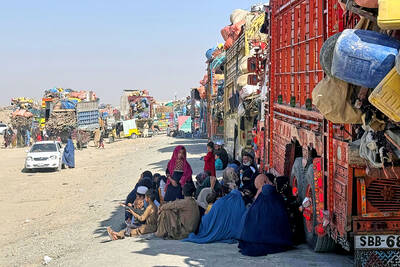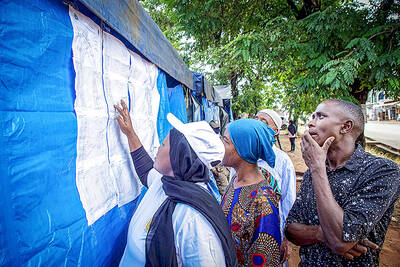Saudi Arabia’s King Abdullah has appointed his half brother, who is the kingdom’s powerful interior minister, as the nation’s second deputy prime minister, an announcement said late on Friday.
The appointment indicates a succession order in the royal family after four years of speculation over who will be the next-in-line once current heir, Prince Sultan, becomes king.
A royal statement carried by the official SPA news agency said Prince Nayef will take over the post, which is seen as crown-prince-in-waiting.
The Saudi Constitution does not require the king to appoint a second deputy prime minister but Friday’s move will allow Abdullah to travel abroad.
With Sultan, who is in his 80s, away in the US on medical treatment, Nayef’s appointment will ensure that when Abdullah goes to the Arab Summit in Qatar next week and later to the G20 meetings, somebody will be in charge at home.
However, Nayef’s appointment as second to the throne will still have to go through the Allegiance Association, set up by Abdullah in 2006 and composed of his brothers and some of his nephews who vote by a secret ballot to choose future kings and crown princes.
The Allegiance is expected to have the final say on who becomes crown prince after Sultan.
Nayef’s appointment comes five months after Sultan, who is the first deputy prime minister, left for New York for medical tests and later surgery. Rumors have circulated about Sultan’s health, but senior Saudi officials have said he is doing better after surgery.
Under the monarchy, Abdullah also acts as prime minister.
The Saudi monarchy was established in 1932 after its founder King Abdulaziz united the country’s various regions under his command.
Abdullah, now in his mid-80s, assumed the throne in Aug. 2005 after the death of his long-ailing half brother.
Within hours of Friday’s announcement, another of Abdullah’s half brothers, Prince Talal bin Abdul-Aziz, issued a statement saying the appointment of Nayef, who is in his 70s, should not come at the expense of the Allegiance’s authority and that Nayef’s position as second-in-line to the throne should not be assumed.
Talal said that Nayef’s appointment was just “an administrative nomination.”
“I am appealing to King Abdullah to have the royal court declare what is meant by this nomination and that it does not mean that he will be the crown prince,” Talal said.
Talal is considered an outspoken prince and holds no government post. He was forced briefly into exile in the 1960s amid reports at the time that he planned a revolt.

With much pomp and circumstance, Cairo is today to inaugurate the long-awaited Grand Egyptian Museum (GEM), widely presented as the crowning jewel on authorities’ efforts to overhaul the country’s vital tourism industry. With a panoramic view of the Giza pyramids plateau, the museum houses thousands of artifacts spanning more than 5,000 years of Egyptian antiquity at a whopping cost of more than US$1 billion. More than two decades in the making, the ultra-modern museum anticipates 5 million visitors annually, with never-before-seen relics on display. In the run-up to the grand opening, Egyptian media and official statements have hailed the “historic moment,” describing the

‘CHILD PORNOGRAPHY’: The doll on Shein’s Web site measure about 80cm in height, and it was holding a teddy bear in a photo published by a daily newspaper France’s anti-fraud unit on Saturday said it had reported Asian e-commerce giant Shein (希音) for selling what it described as “sex dolls with a childlike appearance.” The French Directorate General for Competition, Consumer Affairs and Fraud Control (DGCCRF) said in a statement that the “description and categorization” of the items on Shein’s Web site “make it difficult to doubt the child pornography nature of the content.” Shortly after the statement, Shein announced that the dolls in question had been withdrawn from its platform and that it had launched an internal inquiry. On its Web site, Le Parisien daily published a

‘NO WORKABLE SOLUTION’: An official said Pakistan engaged in the spirit of peace, but Kabul continued its ‘unabated support to terrorists opposed to Pakistan’ Pakistan yesterday said that negotiations for a lasting truce with Afghanistan had “failed to bring about a workable solution,” warning that it would take steps to protect its people. Pakistan and Afghanistan have been holding negotiations in Istanbul, Turkey, aimed at securing peace after the South Asian neighbors’ deadliest border clashes in years. The violence, which killed more than 70 people and wounded hundreds, erupted following explosions in Kabul on Oct. 9 that the Taliban authorities blamed on Pakistan. “Regrettably, the Afghan side gave no assurances, kept deviating from the core issue and resorted to blame game, deflection and ruses,” Pakistani Minister of

UNCERTAIN TOLLS: Images on social media showed small protests that escalated, with reports of police shooting live rounds as polling stations were targeted Tanzania yesterday was on lockdown with a communications blackout, a day after elections turned into violent chaos with unconfirmed reports of many dead. Tanzanian President Samia Suluhu Hassan had sought to solidify her position and silence criticism within her party in the virtually uncontested polls, with the main challengers either jailed or disqualified. In the run-up, rights groups condemned a “wave of terror” in the east African nation, which has seen a string of high-profile abductions that ramped up in the final days. A heavy security presence on Wednesday failed to deter hundreds protesting in economic hub Dar es Salaam and elsewhere, some